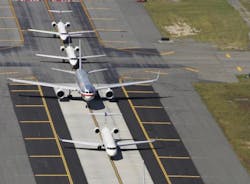Airports are scrambling to develop plans to deal with the unexpected arrival of planes, especially during bad weather, to keep passengers from being stuck for hours on their tarmacs.
Airlines have long had plans for where to send planes when routes are blocked by weather or planes suffer mechanical problems. They face huge fines if they keep passengers waiting on the tarmac for three or four hours.
But after some passengers sat for more than seven hours on Hartford's airport tarmac during an Oct. 29 snowstorm, Congress ordered all the nation's airports to submit plans to the Transportation Department for dealing with diverted planes.
Those plans are due May 14, and must include how the airport will provide for getting passengers off planes after long tarmac delays, how they'll share facilities and make gates available during an emergency, and how they'll provide a secure area for international passengers who haven't cleared immigration and customs.
At Hartford, pilots diverted 28 flights in a massive snowstorm from New York City-area airports. As snow piled up and water ran out, some pilots pleaded to get to the 22 gates that were already occupied and where the staff was overwhelmed.
Some airports have struggled with emergencies and devising plans because they haven't been notified in the past if they're an emergency destination until a flight arrives -- and then they often don't control the equipment for towing or unloading planes.
A plane can show up from an airline that doesn't usually fly there. An international flight could arrive where there are no Customs and Border Protection officers.
Airport executives have been meeting for months with each other, airline representatives and the Federal Aviation Administration to sort out responsibilities in an emergency.
"The difficulty is that every airport is different," says Deborah McElroy, executive vice president for policy and external affairs for Airports Council International-North America. "There has been a lot of discussion about who will do what and when."
Airlines have to let passengers off planes that are delayed on a tarmac for more than three hours for a domestic flight and four hours for an international flight. They also must provide passengers with food, water and toilet facilities. Failure to do so could mean $27,500 fines for each passenger.
As of February, airports could be fined $25,000 for violations in handling diverted flights.
"Gone are the days when airports can just turn a blind eye to poor airline passengers and the crews on the planes," says Kate Hanni, who has campaigned for passenger rights as head of FlyersRights.org since she suffered a lengthy delay.
Unexpected guests
Airport officials say they're at a disadvantage because airlines don't necessarily alert them when flights are headed their way.
Airports may not have the equipment to deal with unfamiliar planes. At night, gates might be occupied by other planes, making it harder for diverted flights to unload passengers and luggage.
At Dallas/Fort Worth International, James Crites, executive vice president for operations, found that airlines each developed diversion plans without realizing others can overwhelm the same location. He's urging airlines to spread diverted flights among airports.
"Don't even land them in an area that's going to get nailed by the sleet and the snow," Crites says. "It was kind of an eye-opener this past year."
Bangor International in Maine learned how to deal with diversions because the airport is along the path for European flights.
In one case, a 2004 flight from London to Washington was diverted to Bangor because passenger Yusuf Islam, the musician formerly known as Cat Stevens, was aboard despite being on a no-fly list.
Tony Caruso Jr., the assistant airport director, says local plans call for refueling planes and supplying food and perhaps lodging for passengers stranded unexpectedly.
Caruso says the airport stores up to 2 million gallons of fuel to cope with unexpected flights.
The airport's catering contract calls for providing meals when several hundred unexpected passengers arrive. Caruso's staffers have contacted hotels and bus companies, so they know where to turn for lodging and transportation for overnight stays.
One problem in Hartford was the lack of Customs and Border Protection workers to screen passengers arriving from Paris. In Bangor, Caruso says a vacant terminal has been reconfigured to handle diversions. It includes a private, secure area for international travelers.
"We've learned through trial and error what we need to do," Caruso says.
Copyright 2012 Gannett Company, Inc.All Rights Reserved



